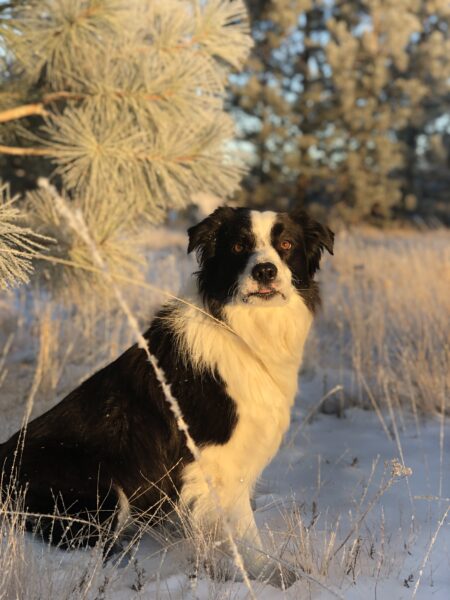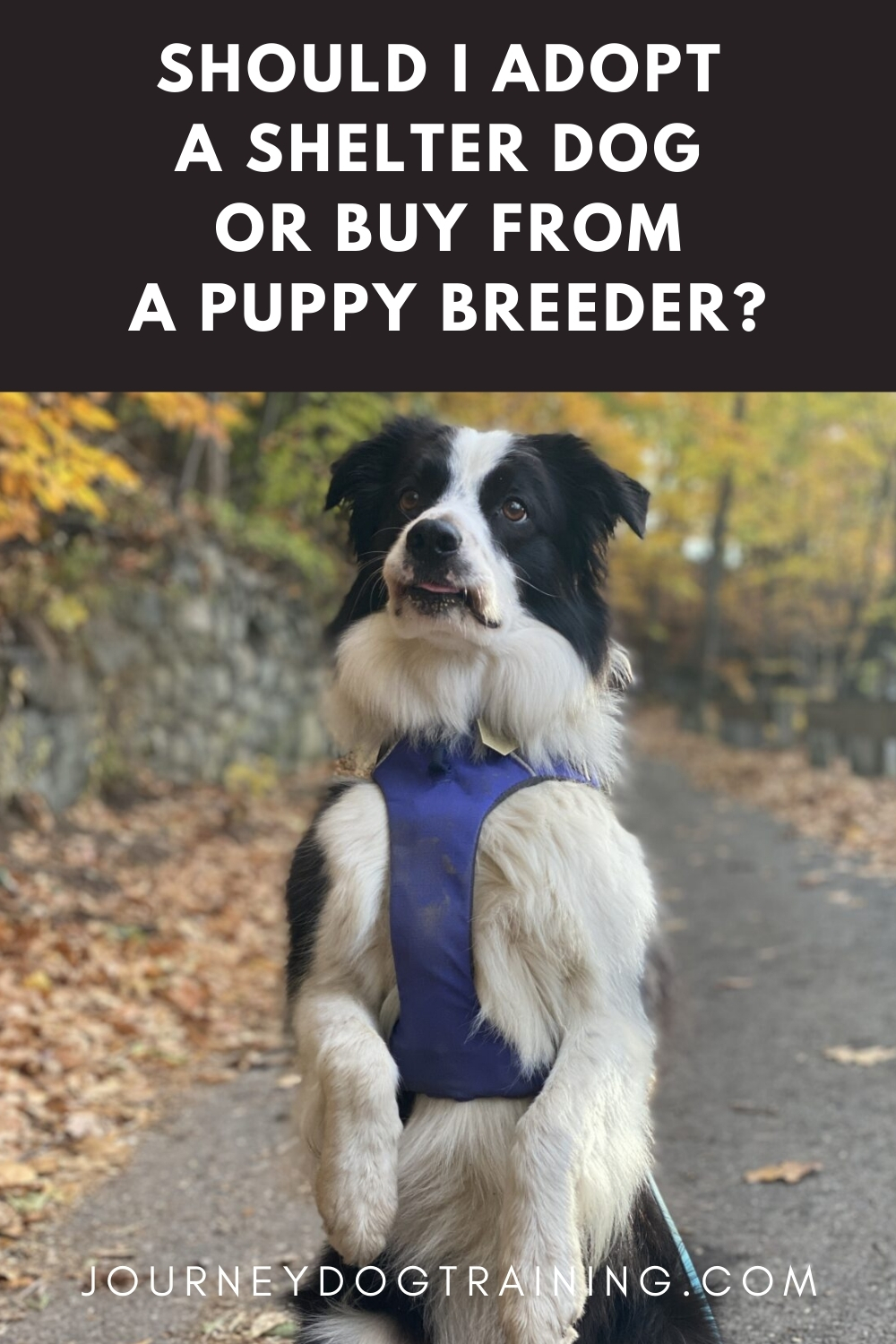I have some very exciting news: Barley and I are welcoming a new puppy into our lives soon. It’s been me and him for the last 3.5 years; he’s been with me through 9 countries, 30+ states, 2 big breakups, and a few big moves. I’ve really enjoyed the bond that he and I have built together, and I’m honestly nervous about changing it up by adding another dog to our dynamic! But I’m ready to welcome another dog into my home.
If you’re reading this, I’m guessing you’re in a similar boat: it’s time to bring home a new dog. Congrats!
But here comes the tricky next question: where should your dog come from? We’ve all heard plenty of “adopt, don’t shop” rhetoric. We’ve also heard that mixed breeds are healthier and that there are lots of shelter dogs needing homes. But what if you want a puppy? A certain breed? Or what if you have really specific goals for your next dog? Then the decision feels less clear.
I adopted Barley from a shelter, and he’s perfect in my eyes in every single way (ok, if he wasn’t so prone to stealing food, that’d be nice). If I could just have Barleys for the rest of my life, I’d be thrilled. He’s goofy, friendly, easygoing, intense, smart, ball-crazy, energetic, and just a bit neurotic and obsessive. He’s sensitive enough to challenge me as a trainer while forgiving enough to make me look great. And he’s a shelter dog!
But I’m not going to get my next dog from a shelter. I’m currently speaking to two different breeders, and I expect to bring home a puppy from one of them before 2020 is out. Why am I not returning to the shelter after having such great luck last time?
I’ll walk you through my decision making process and then lay out the factors that you might find helpful when you’re making this decision, too.
Why I’m Getting My Next Dog From a Breeder
1. Availability of shelter dogs.
I have been looking for a shelter/rescue dog for 8 months and not had any luck. There are a few things at play here:
- COVID has actually emptied a lot of shelters around the country. It seems like everyone is adopting, and shelters are empty. That’s great! But not if I’m looking for a dog, too.
- Montana is extremely rural, and we simply don’t have many shelters or rescues to choose from. I’m sure that if I were in a bigger city, I’d have more options and potentially more luck.
- I’m extremely picky, which we’ll talk about more later on.
- Shelters and rescues are reluctant to adopt to out-of-state adopters right now due to COVID, and I’m reluctant to travel far for a shelter dog. I’ve actually attempted to adopt THREE different dogs since March 2020 (I’m writing in November 2020) and 2/3 of them have fallen through due to distance and COVID restrictions.
- When I adopted Barley, I worked at a shelter. I was able to meet him and place an adoption hold on him before the shelter even opened that morning! I no longer have that luxury and have missed out on a few good matches because of it.
2. Breed preference.
I have a strong breed preference. I want another border collie or maybe a border collie mix, depending on the mix. And while there are plenty of border collie and border collie mixes that show up in shelters, I’m super picky on temperament and so far I haven’t found any good matches in my local area (and have been turned down when I attempted to adopt out-of-state).
This would be even more challenging if I wanted a rare breed like a Saluki or a really popular breed like a Golden Retriever. I can count the number of both breeds I’ve seen in shelters on one hand, even after years of working in some of the largest shelters in the country.
3. Temperament and personality match.
I have specific temperament needs. I work with detection dogs, and am a professional dog trainer specializing in behavior issues. Any dog I bring home will need to be able to travel well on planes and long car rides, get along with other dogs, perform complicated training in front of crowds, keep up with a rigorous training and exercise schedule, and more.
I don’t want to bring home a dog that will just tolerate my ultra-intense lifestyle: I’m looking for a dog that will thrive with it! This is probably the biggest reason that I haven’t had any luck finding a dog I want in a shelter environment. It’s a big ask!
4. Looks matter!
I hate to admit it, but I do have a preference on look. Barley is gorgeous and I absolutely adore him, but I wanted a prick-eared merle border collie. I am so glad I compromised on those traits with him – it was 100% worth it! However, I do have a “look” that I really, really like. Going with a breeder allows me to select for that look within reason.
Of course, color and look shouldn’t be your top priority. But hey, while I’m making my wishlist… My friends Sarah Stremming and Hannah Brannigan said it well when they said something along the lines of, “You only get so many dogs in your lifetime. You might as well like looking at them.”
5. Age isn’t just a number.
I am not opposed to adopting or purchasing an adult dog, but I want my next dog to be under 3 years old. I don’t see myself as someone who will own more than 2 dogs at a time for a very long time (maybe ever). In fact, I’m scared you-know-what-less of the idea of even bringing home a second dog.
Given my line of work, it’s just not reasonable for me to bring home a 5 year old dog and spend years training them for detection work, only to need to retire them in a few years.
6. Supporting responsible breeders.
Let’s be perfectly clear here: not all breeders are evil or greedy! Many of my good friends are dog breeders and they care more about their dogs than just about anyone I know. The amount of time, energy, and money that they pour into making pairings, raising and training and titling the parents, caring for the pregnant momma, raising the puppies, and pairing them with their new homes is truly astronomical.
If we’re successful with responsible sheltering (spaying/neutering, providing behavioral and health and financial support, and making good matches with adoptions), at some point we’re going to NEED to get dogs from breeders. Read that again it if blew your mind – it made my head spin the first time I heard it.
We will eventually run out of dogs if we spay and neuter every single dog, properly match dogs with good homes, and provide those homes with the training, health, and financial support that they need to succeed with their dogs. We need to get puppies from somewhere, and responsible breeders need to be part of the future of dog ownership.
7. Health.
I want my dog to have a long, healthy life. Going with a responsible breeder that carefully matches parents, health tests, and more helps reduce the risk that I bring home a dog that develops health issues later on that could end their working career or even life.

Factors to Consider When Deciding Where to Get Your Next Dog
There’s no right or wrong choice here: only what feels best for you at this time. Here are some of the factors to keep in mind as you make this important decision:
- Lifestyle needs. Allergies, exercise requirements, size or breed restrictions on your housing, and more are all important factors. If you need a hypoallergenic dog under 20 pounds because of your lease and a roommate’s mild allergies, you are unlikely to find a match in most shelters. It’s not impossible, but it will be very tough!
- Household dynamics. Many shelters will struggle to match you with a dog if you have small children and another dog (or cat) and an unfenced yard and you work full time. Does that mean you can’t get a second dog? Of course not! But in many areas, you’ll struggle to find a shelter dog that can handle this very normal life.
- Goals. Many dog sport competitors, service dog handlers, and working dogs handlers have success with shelter dogs, myself included! However, specific goals and needs will be more challenging to meet with a shelter dog.
- Even adopting a puppy from a shelter is a big unknown because you don’t know how that puppy will mature. In fact, I personally would rather adopt an adult shelter dog than a puppy because at least then I know what I’m getting.
- It’s not all in how you raise them: puppies born to highly stressed or starved mothers or aggressive fathers are going to carry that genetic and epigenetic burden for their entire lives. It doesn’t mean that all shelter puppies are going to be challenging adults, but it’s a gamble.
- Availability. There’s massive variability across the US and around the world in what you can find at shelters. Depending on where you are and what you’re looking for, you might have no problem finding a perfect match at a shelter or it might be such a long shot it’s basically impossible.
- Budget. All dogs are pretty expensive over time. But shelter dogs tend to be a great deal. When I adopted Barley, he was fully vaccinated and neutered. His adoption fee was under $100. While we still needed supplies and he’s had his fair share of veterinary bills over the year, we avoided the other large upstart costs for buying a puppy.
- As a comparison, I’ll spend between $900-$1,200 on my next puppy and that doesn’t include all of their vaccinations and other medical checkups – plus the puppy will need all the same supplies as Barley plus we’ll need to buy different sizes of some items like a bed, harness, and crate as the puppy grows. I simply couldn’t have afforded these start-up costs when I first adopted Barley!
- Other preferences. It’s ok to want a smaller dog, a certain coat type, a male versus female, etc. While I urge most people not to get too picky (especially with looks), there’s a balance to strike here. If you have a strong preference and are willing to wait for the right dog, go for it!
- Health testing. Many shelter dogs are healthy – Barley has no evidence of any heritable disease and his hips, elbows, eyes, and hearing are all excellent. Of course, the flip side is true as well: even the best breeders in the world will occasionally produce a puppy that has some health concerns.
- But most breeders worth your time and money will offer plenty of health information on the relatives, health testing on the parents (and this is far more than a health checkup), and testing/screening for the puppies. The exact health testing will vary based on breed, but is always more than just ensuring that the parents are healthy.
- In border collies, my main concerns are epilepsy, hearing issues, anxiety, sound sensitivity, and obsessions or fixations. Orthopedic issues are a concern in almost every breed, so look for a breeder that does the minimum health testing recommended by the breed club (simply Google “breed name” + health testing recommendations + breed club to find this). Know that if you go with a shelter dog, you may be taking a bit more of a risk on health issues.
- Community need. If you live in an area where shelters are overworked and under-resourced, you can do a lot of good by adopting a shelter dog! I urge most people to at least explore their shelter options to see if they can find a good match and potentially save a life. If you’re willing and able to take on a dog who needs some extra TLC or can find your perfect match in a shelter or rescue, great! Adopt them right away and get down to living your life together.
- Sourcing ability. It’s imperative that you’re able to source a dog responsibly, whether that’s from a breeder or a shelter/rescue. Purchasing a puppy online or from the grocery store parking lot often supports unsavory breeders and you don’t get the benefits of working from a stellar breeder. It’s a lose-lose!
- While you might feel like you’re “rescuing” a puppy or helping someone with an oops litter, sometimes you’re actually supporting a network that preys upon your desire to rescue a cute ball of fluff. Proceed with extreme caution – if at all.
- And no matter what they say at the pet store, puppies from the vast majority of pet stores are from puppy mills. Stay away!!!
- Expect finding a well-bred puppy to take time. You won’t be able to being home a puppy next week in most cases! You need to get to know the breeder and often will need to wait for at least a few months before a puppy is ready to match with you.
- On the flip side, some rescues are extremely poorly run. In my time working at an animal shelter, we saw many cases of neglect and cruelty and hoarding from so-called rescues that got out of hand. Supporting these irresponsible rescues is harmful, just like purchasing from an unsavory breeder.
Where to Look for Responsibly Sourced Dogs
No matter what you decide, your two main goals are to find a responsibly sourced dog that matches your lifestyle and needs.
It doesn’t serve anyone well long-term for you to bring home a dog that is a poor match for your lifestyle (an energetic Labrador from a fancy breeder can be just as challenging to live with as an ultra-fearful shelter mutt, depending on the home) or to “rescue” or purchase a dog from an irresponsible source.
Most municipal shelters could really use your help right now; start there first for shelter dogs. If you have more specific needs, seek out shelters with a behavior department that can help match you to the right dog or find a breed-specific rescue.
There are also often specific Facebook groups for specific purposes. I have found many promising dogs for my purposes through the “Adoptable Performance Dogs” Facebook group as well as the “Adoptable Sport and Working Dogs” Facebook group. Of course, if you’re just looking for a nice family pet those groups aren’t the right place to look.
It might sound surprising, but I still start my search for good breeders on Facebook in most cases. I am a member of several great dog training/behavior groups, including “Fact or Fiction: Uncensored Opinions of Dog Breeders.” I found one of my prospective breeders through that group. I found the other breeder through the “FDSA Available Dogs” group, which is only available to Fenzi Dog Sports Academy Alumni.
You may also want to check out The Functional Dog Collaborative. This is a group of fabulous breeders who aim to produce healthy, behaviorally sound dogs for all sorts of purposes. You can find everything from responsible golden doodle breeders to doberman breeders aiming to improve the health of the breed to sport mix breeders creating all sorts of superdogs. It’s a treasure trove!



This is awesome! I get a lot of questions from my friends why I’m not adopting from a shelter when I tell them I’m going to get a puppy from a breeder. This page perfectly describes it.